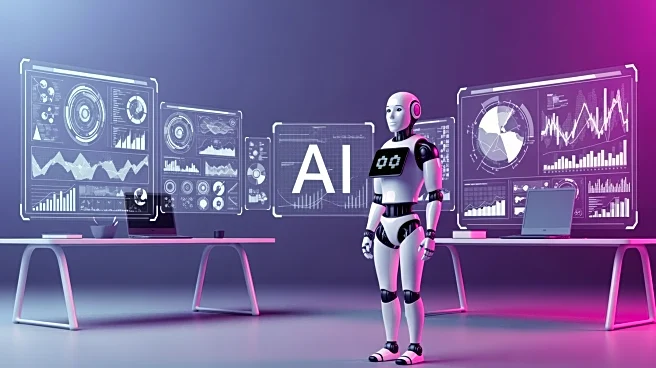What's Happening?
Despite significant investments in artificial intelligence, many organizations are struggling to effectively implement AI technologies due to workforce unreadiness. According to Kyndryl's 2025 AI Readiness
Report, while 95% of firms have invested in AI, 71% report their workforce is not prepared to adopt these technologies effectively. Dr. Vishnu Nanduri, Head of AI and Innovation for ASEAN and Korea at Kyndryl, notes that the disconnect between investment and implementation is a major issue, with only 54% of companies seeing positive returns and 62% not moving past the pilot phase. The report identifies fear and lack of skills as key factors hindering progress, emphasizing the need for companies to foster a culture of psychological safety and invest in upskilling. Aaron McEwan, VP, Advisory in the Gartner HR practice, agrees that many organizations lack clarity in their AI strategy and adoption planning, which contributes to the stalled progress.
Why It's Important?
The workforce unreadiness in adopting AI technologies has significant implications for businesses and the economy. Companies that fail to effectively implement AI may miss out on potential efficiencies and competitive advantages, impacting their growth and innovation. The talent gap in AI skills can lead to stalled projects and wasted investments, affecting the overall productivity and profitability of organizations. Addressing these challenges is crucial for businesses to leverage AI's full potential and drive economic progress. Moreover, the fear of job loss and unethical use of AI among employees highlights the need for transparent communication and ethical guidelines to ensure responsible AI adoption.
What's Next?
Organizations are expected to focus on bridging the talent gap by investing in training and development programs to enhance AI literacy among employees. Companies may also need to reassess their AI strategies and adoption plans to ensure clarity and alignment with business goals. As AI continues to evolve, businesses will likely explore partnerships and collaborations to access AI expertise and resources. Additionally, addressing employee concerns about job security and ethical AI use will be crucial in fostering a supportive environment for AI integration.









